These are my own stories.
I often think how blessed I was to become Orthodox during the era of these four great men – and even more blessed to have met all of them. (I mean, I was pastor of only a little parish church in the Midwest.) One I knew only in passing, and I doubt he remembers me. Two of the others I think I knew well. And in all four cases I have stories to tell. Three of them are gone now from this earth – and being the age I am, I think I shouldn’t wait any longer to share my recollections!
So today I just want to gather you ’round and tell stories. Nothing deep and theological now – just some insights into the character and grace of these four good shepherds.
His Eminence Metropolitan Philip
Archbishop of the Antiochian Orthodox Archdiocese of North America
May his memory be eternal!
 Philip Saliba was born in Lebanon, but he became a visionary for Orthodoxy in America. He promoted English language worship and peoples’ verbal participation in the Liturgy, with music they could sing. He preached “America! Come home to the faith of Peter and Paul!”
Philip Saliba was born in Lebanon, but he became a visionary for Orthodoxy in America. He promoted English language worship and peoples’ verbal participation in the Liturgy, with music they could sing. He preached “America! Come home to the faith of Peter and Paul!”
from the Antiochian Archdiocese website
When Syrian Orthodox in America were divided into two separate jurisdictions, he (newly consecrated) offered to become assistant in order to achieve unity. Instead Archbishop Michael, humbled by his offer, became his assistant and the Archdioceses were united into one Antiochian Archdiocese of North America. Under Philip’s forty eight year “reign”, our Archdiocese more than tripled in size. I loved to watch him preside at Archdiocse Conventions: he was a combination of mischievous boy and Middle Eastern potentate. He strictly limited the length of presentations, until one of our youth got up; then Metropolitan Philip’s face lit up, and he let them go on as long as they liked.
I admired Metropolitan Philip chiefly from afar. But three personal stories:
1 Once after a clergy dinner I had occasion to ask him something. So I went over to his table where a group of Arab clergy were going at it strong about something – in Arabic. I was prepared to begin properly with “Master, bless”, but instead out of my mouth came the words, “I’m glad I don’t know Arabic.” Without a pause Metropolitan Philip, with a twinkle in his eye, answered “Yes, it’s a blessing!” Then I began “Master bless”, and he blessed me.
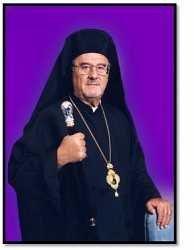 2 Before we clergy travel overseas, we are to get our Archbishop’s permission, so we don’t run around willy-nilly on our own seeming to represent the Archdiocese. After we wrote, Metropolitan Philip always sent a standard form letter of permission. One spring day, searching the internet, I found amazingly inexpensive non-refundable air tickets to Greece and ordered them – and then almost immediately thought, “Oh, no! I didn’t get Metropolitan Philip’s ok!” So I wrote explaining, apologizing, and asking. I concluded, “Saedna, if I have to give up the tickets, my wife will kill me.” This time his response began “Since we do not wish you to be dead…” followed by the usual form letter. At the end he added another personal note: “Do not do this again.” I didn’t.
2 Before we clergy travel overseas, we are to get our Archbishop’s permission, so we don’t run around willy-nilly on our own seeming to represent the Archdiocese. After we wrote, Metropolitan Philip always sent a standard form letter of permission. One spring day, searching the internet, I found amazingly inexpensive non-refundable air tickets to Greece and ordered them – and then almost immediately thought, “Oh, no! I didn’t get Metropolitan Philip’s ok!” So I wrote explaining, apologizing, and asking. I concluded, “Saedna, if I have to give up the tickets, my wife will kill me.” This time his response began “Since we do not wish you to be dead…” followed by the usual form letter. At the end he added another personal note: “Do not do this again.” I didn’t.
3 When I retired, Metropolitan Philip sent me a letter which was so kind and personal. Apparently he knew me, even if I didn’t know him. I was deeply touched by it. I’m not going to share it with you.
His Eminence Bishop Kallistos (Ware)
Metropolitan serving in the Greek Orthodox Church of Great Britain, under the Ecumenical Patriarchate
Bishop Kallistos turned 87 on September 11. Please pray for him and give thanks for his many and illustrious years of service to God the Holy Trinity and to the Holy Orthodox Church.
While I was still Anglican I read “Timothy Ware’s” books The Orthodox Church and The Orthodox Way, and thought the Orthodox Church “has it right”. (It took me many years to understand why he had not remained Anglican.) Since then Timothy Ware has become Bishop Kallistos, and perhaps the best known Orthodox theologian, author and lecturer of the Twentieth and early Twenty-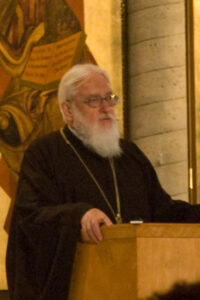 first Centuries.
first Centuries.
Bishop Kallistos speaking at Ascension Greek Orthodox Cathedral, Oakland, California, February 23, 2008 (by Narsil, NSU Free Documentation License)
I first met Bishop Kallistos, very briefly, in the spring of 1988. As an Anglican curious about Orthodoxy, I was visiting Saint Vladimir’s Seminary in Yonkers, NY, just outside New York City, and by chance Bishop Kallistos was also there. One evening I heard him superbly moderate an excellent debate between Father Thomas Hopko and Father John Meyendorff. I was in awe.
The next morning I visited Saint Vladimir’s Bookstore and bought almost more books than I could carry – this was in the days before Amazon and UPS. I was heading out the door to catch a ride to the railway station, struggling to handle my books and my suitcase, when unexpectedly I heard a gentle voice behind me: “May I help you?” It was Bishop Kallistos! This eminent bishop indeed helped me carry my books! and sat with me all the way to Grand Central Station, kindly answering all my inept questions – as I think of them now, but at the time they seemed important – but he in his charity understood and cared.
I met Bishop Kallistos again in 1992 in Oxford. When some congregations from the Church of England wanted to become English-speaking Orthodox parishes, they were having no success finding a home among the Orthodox jurisdictions in England, which were primarily “old world” ethnic. Finally, in desperation, they begged our Antiochian Metropolitan Philip (above) to help. He accepted them, under the auspices of the Antiochian Metropolitan of Paris. Led by Father Peter Gillquist, Khouria Dianna and I were chosen, as former Anglicans, to be part of a group to go to England and help get things started. We met with Bishop Kallistos who, as part of the Greek Archdiocese, this time was not so gentle. He asked us quietly but very pointedly “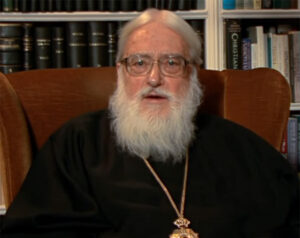 What are you doing here?” (Thus I discovered that Bishop Kallistos can be tough! as Bishops need to be.) Father Peter explained, and the Bishop came to understand. There is now an English-speaking Antiochian Orthodox Archdiocese of Great Britain and Ireland, with about twenty parishes and one monastery.
What are you doing here?” (Thus I discovered that Bishop Kallistos can be tough! as Bishops need to be.) Father Peter explained, and the Bishop came to understand. There is now an English-speaking Antiochian Orthodox Archdiocese of Great Britain and Ireland, with about twenty parishes and one monastery.
Another time, Milwaukee’s Orthodox Churchwomen brought Bishop Kallistos to speak here. I was assigned the happy task of driving him from place to place. We had over-scheduled him, and he must have been exhausted, for he was then in his seventies. Surely he needed rest and silence, but I stupidly felt it was my obligation to make conversation. (Hmm… perhaps he does remember me.) Again he exhibited the kindness and patience of a saint. Enough said.
Father Thomas Hopko
Proto-presbyter of the Orthodox Church in America
May his memory be eternal!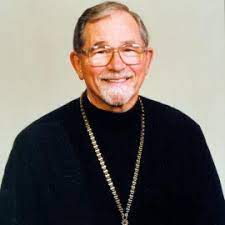
I’ve told you before about Father Tom. As I began this Post I intended not to repeat the stories – but I decided to do so, anyway. I don’t want anyone to miss the story of this amazing man.
courtesy of Saint Vladimir’s Seminary
As I was moving towards Orthodoxy I wondered why Father Tom was giving me so much attention. I later was to discover that he did that for very many. On my trip east in 1988 to “check out” Orthodoxy, I kept hearing from person after person, “Father Tom did [this] for me”, “Father Tom did [that] for me.”
Meanwhile, this man was also professor, then Dean, at Saint Vladimir’s Seminary, a theologian, a prolific author; a family man with wife, children and grandchildren. He lectured all ’round the country and represented the Orthodox Church at meetings in many places, here and abroad. His podcasts on Ancient Faith are innumerable. Yet somehow he kept his personal touch with so many. I have no idea how he did it. The grace of God.
I first met Father Tom when I was invited to an OCA clergy conference in Chicago where he was chief speaker. When he learned I was seeking Orthodoxy, he took his entire rest break after lunch to talk with me. Later when he spoke at a conference here in Milwaukee, I was impressed by his brilliance – occasionally flipping in and out of Greek, Russian, Latin, Hebrew, as appropriate – and also by his lack of pretense. Otherwise he sounded like a guy you might meet at a Milwaukee pub. A refreshing change from some rather effete lecturers I was then accustomed to.
I had questions, so I would write to Father Tom or phone him. Always he responded, giving me thoughtful replies. Sometimes intriguing, challenging, mysterious ones –  “That question cannot be answered from an Orthodox point of view” – which really got my mind moving. Just before I became Orthodox he gave me some helpful guidance, which I won’t share here, but which made an enormous difference in my life.
“That question cannot be answered from an Orthodox point of view” – which really got my mind moving. Just before I became Orthodox he gave me some helpful guidance, which I won’t share here, but which made an enormous difference in my life.
About a year before that, one day I was very discouraged: “I need to be Orthodox. Is it ever going to happen? This is taking so long.” I was feeling just lost. I went out to the mailbox, and there was a small envelope from “T. Hopko”, postmarked from a town in Kentucky where this time he was lecturing at a Protestant college. I opened the envelope, and I swear before I could ever read the note, the Holy Spirit flew out. That was exactly what it felt like. The note said, “Dear Father Bill, I am praying for you. I know everything is going to work out for you. in Christ, Father Tom”.
After we got Saint Nicholas Mission started, one day a package arrived from Father Tom. In it was an icon of Saint Nicholas, in which was embedded a small relic of Saint Nicholas.
Father Peter Gillquist
Arch-priest of the Antiochian Orthodox Christian Archdiocese of North America
May his memory be eternal!
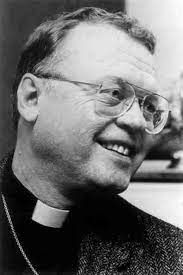 Father Peter was a remarkable man in many ways, but most importantly, a devout man who loved Jesus Christ with all his heart and soul and mind.
Father Peter was a remarkable man in many ways, but most importantly, a devout man who loved Jesus Christ with all his heart and soul and mind.
He was an author of several books. A natural leader to whom people turned because he always seemed to know what to do. A brilliant down-to-earth speaker – people loved to listen to him. A natural evangelist who could without pretense or pressure strike up conversations with total strangers, and in a few minutes they would be telling him their life story, and a few minutes later they would be talking about Christ. (I observed this on more than a few occasions, and was amazed.)
Father Peter was a “normal guy”. I remember riding with him all over northern and central Illinois one January day, visiting potential clergy converts, talking about everything, kidding around, with him putting up with my strange avocation of chasing after trains. We had fun. I remember sitting in our backyard with him, having a beer, and talking about ordinary things – but somehow his conversations always worked their way back to Jesus Christ.
Father Peter was a big hulking deep-voiced Swedish type from Minnesota. He had been a nominal Lutheran, but somehow he had found Christ, and had been leader of a group of about 2000 former evangelicals who 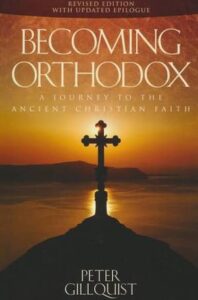 entered our Antiochian Archdiocese in 1987. This is a fascinating story, which you can read in detail in his book Becoming Orthodox, available from many sources.
entered our Antiochian Archdiocese in 1987. This is a fascinating story, which you can read in detail in his book Becoming Orthodox, available from many sources.
The story, briefly:
Back in the 1970s he and some other men had been leaders of Campus Crusade for Christ – speaking at large rallies at Big Ten universities (sort of Billy Graham style), where youth in great numbers would “give their lives to Christ”. He and his fellow Campus Crusaders believed this would change the lives of students for the better. However, after a while they realized that after the students’ big “conversion” experiences, nothing changed. They were missing “follow-up” – nurturing community, church.
So they withdrew from Campus Crusade. Each man went back home and tried to set up a “church” on New Testament principles. When they got together in a year or so, they discovered that their “churches” were all radically different from each other. So what was the New Testament Church really like? They decided to research what the Church was like immediately after New Testament times. What they found was the Fathers. And Orthodoxy. After some years of trying to set up an independent Orthodox church on patristic principles, they finally realized you can’t do that! You have to enter The Orthodox Church. Courageously they and most of their followers did just that, having found a welcome in our Antiochian Archdiocese, thanks to Metropolitan Philip.
Almost immediately the Metropolitan made Father Peter chairman of a new Archdiocese Department of Missions and Evangelism. Over the years he guided dozens of Protestant congregations into our Archdiocese. Some of the stories are told in his book Why Protestant Clergy Are Becoming Orthodox.
At their first Conference on Missions and Evangelism in 1988 I met Father Peter. I was eager, almost desperate to become Orthodox. But how could I choose between jurisdictions? and how sad that I needed to! How would I know when the time was right to leave the Episcopal Church? How would I try to set up an Orthodox mission? How to begin? I was floundering.
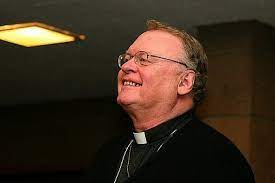 Father Peter took hold and guided me, guided us. Three times he came 2000 miles from Santa Barbara, California, to Milwaukee to get us started. As I’ve written, I know Saint Nicholas himself was behind it all (and Christ the Lord behind him, of course), but without Father Peter’s guidance, I don’t see how Saint Nicholas Orthodox Church, Cedarburg, Wisconsin, would have come into being.
Father Peter took hold and guided me, guided us. Three times he came 2000 miles from Santa Barbara, California, to Milwaukee to get us started. As I’ve written, I know Saint Nicholas himself was behind it all (and Christ the Lord behind him, of course), but without Father Peter’s guidance, I don’t see how Saint Nicholas Orthodox Church, Cedarburg, Wisconsin, would have come into being.
Years later, I said to him, “I’m sure glad you were there to guide us as we got started. You knew exactly what to do every step of the way.” He responded, “No, I didn’t. I had no idea what I was doing. You were our first experiment!”
After we got Saint Nicholas Church going, Father Peter returned at least every year – and each time it was as if someone turned on a light bulb. People just “lit up”. He had that effect. The last time he visited he was ill. I knew he shouldn’t have come, but I didn’t know how sick he was… His funeral was attended by a very large number of people.
I thought of Father Peter as my special friend, and he was. But he was everybody’s special friend. Almost anyone who knew him felt close to him, as if he cared especially for them. He did.
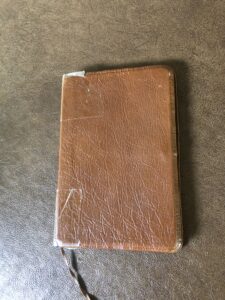 Every morning I pray the Psalms from a now “beat up” little New Testament/Psalter which he gave me. Inside the cover it says: “September 17, 1989. For Fr. William Olnhausen, On the day of your ordination to the priesthood of the Holy Orthodox Christian Church, Many years! Your brother in Christ, Fr. Peter Gillquist. Phil 1:27
Every morning I pray the Psalms from a now “beat up” little New Testament/Psalter which he gave me. Inside the cover it says: “September 17, 1989. For Fr. William Olnhausen, On the day of your ordination to the priesthood of the Holy Orthodox Christian Church, Many years! Your brother in Christ, Fr. Peter Gillquist. Phil 1:27
I think of that little Bible now as a holy relic.
Philippians 1:27: “Whatever happens, conduct yourselves in a manner worthy of the gospel of Christ. Then, whether I come and see you or only hear about you in my absence, I will know that you stand firm in the one Spirit, striving together as one for the faith of the gospel”.
Now that Father Peter can no longer “come and see us”, I trust and believe that he can “hear about us in his absence, striving for the faith of the gospel”.
Next Week: The Saint who almost made it
Week after Next: 2020 Orthodox Church Statistics Uh oh…
Wonderful! Thank you Father Bill!
I met Fr Peter when I met you when you came to England in 1992.
I was an Anglican priest and it was 20 years before I could become Orthodox (long story 😉).
I have been fortunate enough to meet Metropolitan Kallistos on many occasions!
I was ordained deacon 5 months ago.
Glory to God for all things!
Thank you, Father Bill!
Thank you, Father Bill. Met. Ware was the first Orthodox writer recommended to me on my way into the church, and he remains one of my favorites. I doubt I’ll get the chance to ever meet him, sadly, as I rarely get to travel much, but thankfully many of his talks are available on Youtube. I relisten to them often.
Met. Philip was directly influential on my own parish’s priest in terms of spurring him into the priesthood.
Thank you for the funny stories about Metr. Philip on your blog last week! I could hear and see him doing that!
You obviously haven’t read the scandalous article Metropolitan Kallistos wrote for the Wheel journal spring/summer 2018) on the subject of homosexual marriage. https://www.wheeljournal.com/13-14-ware He seems to advocate gay “marriage” in the Orthodox Church. Also for years Ware has been banging on about women priests. In this he is thoroughly Anglican, and at times his Orthodoxy seems almost fraudulent. Old age affects some people in a bad way mentally. We must pray for his repentance and ultimate salvation.
To Old Reader from Old Blogger:
As you suggested, I read Metropolitan Kallistos’ article. I disagree with him. I see homosexual activity as disordered, more as a “temptation” to be resisted. ( See my Posts 71 and 72: https://frbillsorthodoxblog.com/2018/06/22/71-orthodoxy-and-lgbtq-part-1/ and https://frbillsorthodoxblog.com/2018/06/29/72-orthodoxy-and-lgbtq-part-2/ )
As to his “banging on” about women priests, I’ve read only a small paragraph he wrote on that subject. However, so far as I know, in neither case has he advocated, but only raised questions.
While I think his reasoning is dubious, should it be disallowed or ignored? Debating the dogma of the Holy Trinity: no way! But regarding these lesser matters, the Church has never come up with a definitive theology on exactly why women can’t be priests, nor are there any dogmatic statements that I know of regarding homosexuality. In both cases we do have the consistent practice of the Church. Please don’t misunderstand. Neither am I advocating these things.
However, the Church’s practice regarding usury and funerals for suicides has changed. Can other things be changed? Why? or why not? In all these matters I’d like challenging questions to be asked so maybe we can work out why we believe what we believe.